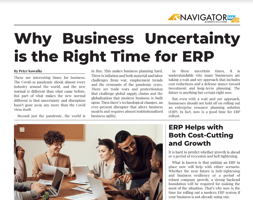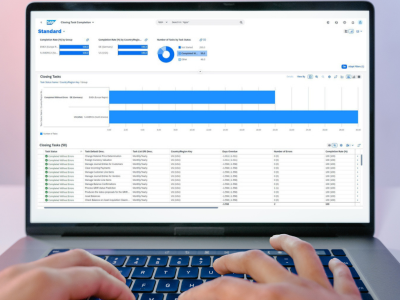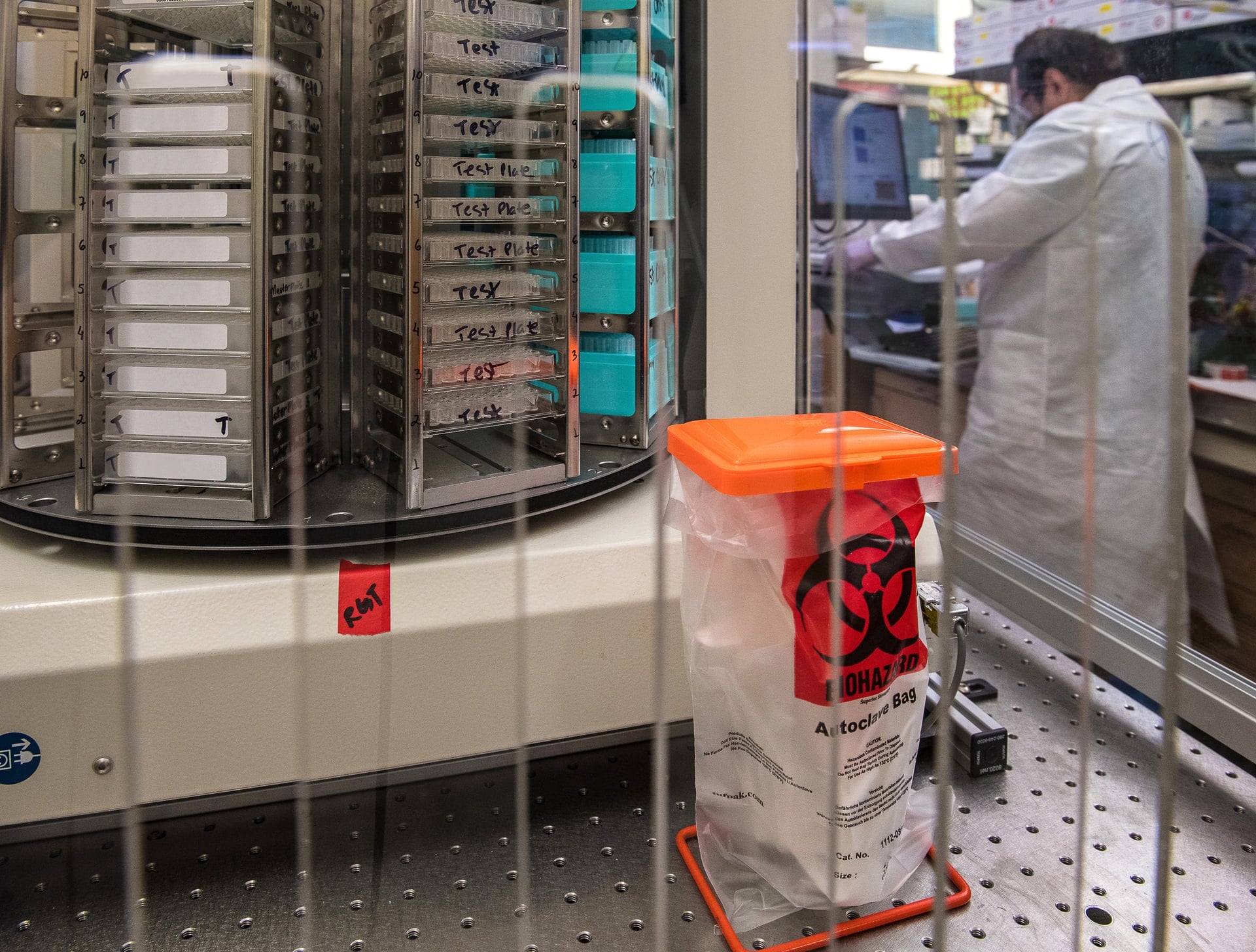These are interesting times for business. The Covid-19 pandemic shook almost every industry around the world, and the new normal is different than what came before. But part of what makes the new normal different is that uncertainty and disruption haven’t gone away any more than the Covid virus itself.
Beyond just the pandemic, the world is in flux. This makes business planning hard. There is inflation and both material and labor challenges from war, employment trends, and the remnants of the pandemic years. There are trade wars and protectionism that challenge global supply chains and the globalization that modern business is built upon. Then there are technological changes, an ever-present disrupter that alters business models and requires almost institutionalized business agility.
In these uncertain times, it is understandable why many businesses are taking a wait-and-see approach that includes cost reductions and a defensive stance toward investment and long-term planning. The future is anything but certain right now.
But even with a wait-and-see approach, businesses should not hold off on rolling out an enterprise resource planning solution (ERP). In fact, now is a good time for ERP rollout.
You can download the article here.
ERP Helps with Both Cost-Cutting and Growth
It is hard to predict whether growth is ahead or a period of recession and belt-tightening.
What is known is that putting an ERP in place now will help with either scenario. Whether the near future is belt-tightening and business resiliency or a period of robust company growth, a strong backend foundation will be required for making the most of the situation. That’s why now is the time for rolling out a modern ERP system if your business is not already using one.
In the case of business contraction and cost reduction, an ERP system will assist and pay for itself by enabling an organization to do more with less through greater efficiency, reduced headcounts, automation, cost savings, and a better understanding of business dynamics for intelligent adjustment as market conditions change.
If business growth is ahead, an organization will have a head start by already having the foundation for scalability and rapid expansion. By putting an ERP system in place now, a business will have a scalable backend ready to handle increased order volume, rapid hiring, added supplier relationships, and new branch offices.
Equally important, an ERP system will help with uncovering market opportunities and making the most of them as the business grows as a result of greater visibility and analytics. Startups will have the advantage of being ready for funding rounds, too, since having an ERP in place is one of the things that investors look for when making investment evaluations.
Implementing ERP Requires Less Than You Think
One concern often voiced by businesses that are considering ERP is the time and cost it might take to put an ERP system in place. With large-scale business uncertainty, there’s the tendency to label ERP implementation a major infrastructure project that should be implemented later.
Much of this concern rests on the myth that ERP is for large businesses only.
While the ERP systems used by the likes of Pfizer and Coca-Cola do typically cost several millions of dollars and require years of setup work, today there also are ERP solutions for small and fast-growing businesses that can be rolled out in a matter of months and cost no more than what a business already is paying today for business software.
ERP rollout still is a project, but it is a doable project. Turnkey ERP solutions can enable rollout in as little as 1-3 months, and any business with more than $1 million in annual revenue can afford one.
These small business offerings also scale, and can be upgraded relatively easily to the larger ERP systems that power the largest businesses. Two examples of these ERP solutions that are both scalable and relatively quick to implement are SAP Business One for small businesses and SAP Business ByDesign for fast-growing smaller businesses.
ERP Planning Assists Business Planning
The hardest and most important component of rolling out an ERP solution is the planning before implementation: understanding the organization holistically, defining needs and processes, and assessing the businesses’ current and future capabilities (see our free guide for more on this topic). This is essential for a good ERP rollout.
This deep assessment of an organization and its operations also is critical for effectively adjusting strategy and managing risk in uncertain times. The lion’s share of work for ERP implementation is the very same work that a business already should be performing right now. Preparing for an ERP rollout creates the catalyst for the deep work of weatherproofing a business at the same time as it sets a stronger operational foundation for whatever the future brings.
Planning an ERP implementation, therefore, does double duty in times of business uncertainty. It supports an overall business review while simultaneously laying the foundation for cost reductions, greater efficiency, and having key systems in place for rapid growth.
So the process of rolling out an ERP solution is itself support during times of uncertainty.
ERP Makes Employees More Effective
Improving employee performance always is key, but it takes on added importance during times of uncertainty when holding or reducing headcount might be required. Widespread recent challenges with hiring and retaining employees make worker efficiency even more essential.
ERP helps improve employee efficiency in a number of ways.
- Reduces data entry. As an intelligent, end-to-end backend system, ERP significantly reduces the need for data entry by centralizing and automating data collection from devices in the field, on the shop floor, and using what’s already within the system.
- Automates routine tasks. With system-wide automation, ERP helps employees focus on higher-value work instead of routine tasks that are better left to machines.
- Breaks down data silos. Finding and using business data is much faster with ERP because it serves as a single source of truth, housing and making available all data within a business through a single interface.
- Enables anywhere access. Because ERP is in the cloud and encompasses all processes and business data, employees can more easily work remotely, rely on mobile devices, and access authoritative data as needed with ERP.
- Assists with decision-making. System prompts and process automation within ERP improve decision speed, and a real-time, holistic view of operations helps with accurate planning and execution at all employee levels.
ERP Makes Businesses More Efficient
During times of growth, business efficiency improves margins and competitiveness. During times of uncertainty or contraction, efficiency helps businesses wait out market downturns and reduce costs.
Just as ERP greatly assists with employee efficiency, it also improves overall business planning and efficiency.
Increases operational visibility. ERP gives a full picture of a business in real-time, from sales data and inventory to detailed production activity. With full visibility, opportunities for process and strategy improvements can be identified more quickly.
Enables data-driven decision-making. With all data flowing into the system in real-time and both analytics and custom reporting to help make sense of it, ERP encourages and enables more accurate data-driven planning.
Strengthens processes. Process automation within ERP enforces standardization and enables the development of more efficient systems, and default best practices built into ERP automatically cut down on inefficiencies around standard business processes.
Improves integration. IT and data sharing inefficiencies are reduced with ERP because most business activity takes place within the system. Where third-party solutions still are required, ERP enables wide integration so all software is talking together.
Helps with supply chain optimization. By having a complete and accurate picture of supply chain relationships in real-time, and the ability to connect directly with supplier systems through APIs, ERP enables sophisticated supply chain optimization at the level of a multinational.
Shortens Accounts Receivable Times. ERP improves the efficiency of collecting payment through real-time reporting, automated notifications and invoicing, and analytics that predict and cut down on late payment.
Growth When You’re Ready
Rolling out an ERP system now also makes sense for businesses hoping for growth in the near future. ERP helps both with weathering a challenging business environment and preparing for times of rapid or steady growth, which is why ERP makes sense during uncertain times. With a scalable ERP solution in place, businesses are future-proofing against either eventuality.
By putting an ERP system in place before rapid scaling, the foundation is in place for growth without having to build out capabilities in the midst of the growth spurt. Order volume will scale seamlessly, headcount can be expanded simply from a systems perspective, additional functionality can be easily added when it is required, and a larger number of vendors can be managed without problems.
ERP also is essential for businesses that might be adding regional offices in the future. Extending backend infrastructure to include additional offices in the same country is simple because everything is centralized in the cloud and easily extended as a result. ERP also paves the way for expanding into new markets because it is easy to connect ERP systems between subsidiaries in different countries while segregating data to meet local requirements at the same time. That’s hard to do with something less than an ERP.
So while these are interesting times for business, and many things are uncertain, there is at least one certainty: If your organization is not already running on a modern ERP system, now is a good time to get one in place.
For more on how ERP can help your business, contact one of our ERP consultants at (801) 642-0123 or by emailing us at info@nbs-us.com.








